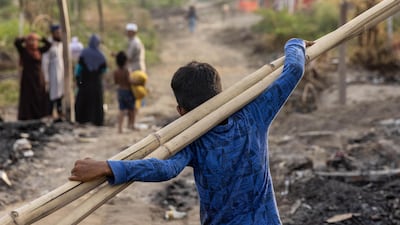Palestinians and the Rohingya are among the 15 million stateless people unable to gain access to Covid-19 vaccines, new research has found.
The report highlighted the disparity in vaccination rates for Palestinians in the West Bank and Gaza, and in Israel, which has one of the world's highest rates of population inoculation.
Rohingya people living outside Myanmar, often in squalid, overcrowded camps, voiced fears that they will not be included in national vaccination campaigns.
The findings came from the Global Covid-19 Consortium, a group of activists and NGOs in 13 countries set up by the Institute on Statelessness and Inclusion (ISI) affiliated with Middlesex University in England.
Its new report, Together We Can, details the experiences of the world's stateless people during the coronavirus pandemic.
“The devastating impacts of exclusion and denial of fundamental rights, including health care, during the pandemic relate to much deeper structural problems – the historic and systemic exclusion, deprivation and marginalisation of communities that have been made stateless as part of wider discriminatory political acts, or pursuant to dominant, discriminatory ideologies,” the report said.
Stateless people are less likely to be included in national vaccination campaigns and many cannot afford health care or lack the necessary documentation required to access medical services.
In the report, Ali Johar of the Rohingya Human Rights Initiative said: “We are afraid that our community in India will be excluded from the vaccination process as we don't possess any documents issued by Myanmar [and] the Indian government does not recognise refugee cards issued by UNHCR as proof of identity. In this case, we will be completely dependent on the international community.”
Crucial procedures such as asylum applications or civil registrations have been delayed severely in some countries since the outbreak of Covid-19.
Amal de Chickera, one of the report’s authors, said the vaccine inequity highlighted in the report demonstrated “how stateless people endure the combined impact of global and local inequalities”.
"Vaccine nationalism between and within countries undermines public health imperatives, with devastating consequences for stateless people," he said.
“Internationally, 85 per cent of the world’s vaccinations have been delivered in high and upper-middle-income countries, with only 0.3 per cent being delivered in low-income countries where many stateless people live."
Mr de Chickera, a co-founder of the ISI, said at national levels “the citizens-first approach taken by most states completely excludes the stateless or pushes them to the back of yhe vaccination queue”.
Santino Severoni, the director of the World Health Organisation’s migration health programme, said the report showed “why prioritising the integration and inclusion of the furthest behind is crucial for international relations and public health”.
“Letting nationality determine access to services, including health care and vaccination, is detrimental to everyone’s right to life and is a threat to public health as a whole,” he said.
The work by the Global Covid-19 Consortium is rooted in research carried out in Bangladesh, the Dominican Republic, India, Kazakhstan, Kenya, Kyrgyzstan, Malaysia, Montenegro, Myanmar, Nepal, North Macedonia, Tajikistan and Uzbekistan.
A 1954 UN convention established the legal definition of a stateless person as someone who is “not recognised as a national by any state under the operation of its law”.


